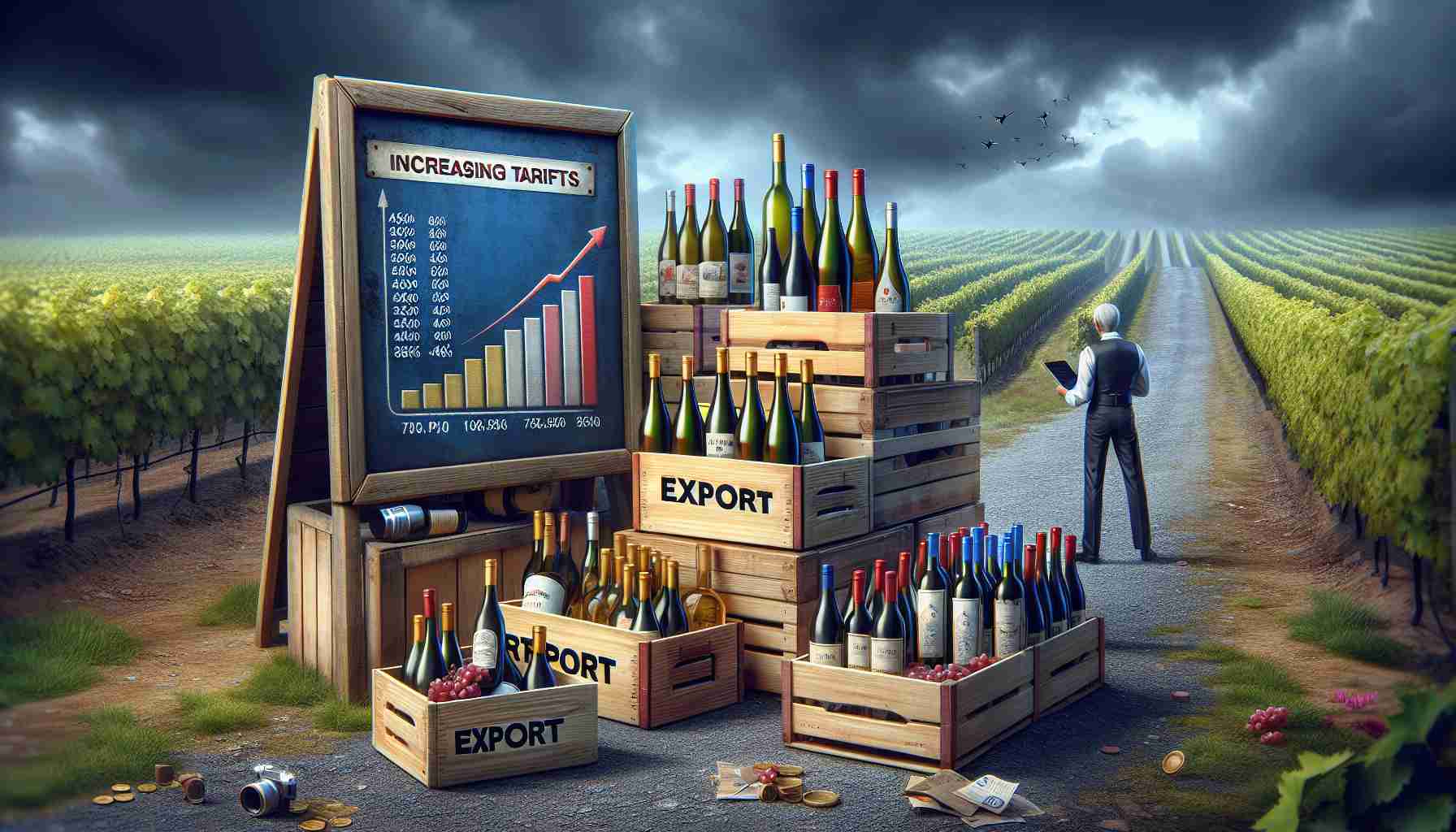- The French wine and spirits industry is under significant threat from increasing tariffs, particularly from China and the potential U.S. tariffs.
- In 2023, French wines and spirits generated €3.6 billion in revenue in the U.S., making it their most profitable market.
- Previous trade disputes have caused substantial losses, with French exports suffering a €450 million drop during earlier conflicts.
- Competitors like Chilean wines are poised to capitalize on France’s vulnerabilities as trade tensions rise.
- Declining domestic production has led to the uprooting of vineyards, heightening the industry’s crisis.
- The situation demands urgent adaptation to maintain the legacy of French wines and spirits in a competitive global market.
In a dramatic twist, the French wine and spirits industry is sailing through turbulent waters as trade wars heat up. With China’s hefty tariffs on cognac reaching between 30% and 38%, the industry now faces another looming threat from the United States, a market vital for its growth. As former President Donald Trump reignites trade tensions, fears are swirling about potential tariffs on French exports that could cripple this beloved sector.
In 2023 alone, French wines and spirits raked in a staggering €3.6 billion ($3.7 billion) in the U.S.—their most profitable market. However, Trump’s aggressive stance on trade has left businesses on edge, anticipating that any announcement could spell disaster. The stakes are high, especially given the bitter history of tariffs on French products.
When past disputes erupted, such as the U.S.-EU conflict over Boeing and Airbus, French exports suffered immensely, losing €450 million in revenue. With fresh perspectives emerging, competitors like Chilean wines are seizing the opportunity. As France struggles under the weight of these tariffs, their foothold in global markets is threatened.
Moreover, a massive decline in domestic red wine production has forced vineyards to uproot thousands of hectares amid uncertain prospects for recovery. The French wine and spirits industry now faces a race against time to adapt or risk losing its cherished legacy.
The key takeaway? With trade tensions escalating, the future of French wines and spirits hangs in the balance, and everyone is watching closely.
French Wines and Spirits: Navigating New Trade Turbulence
The Current Landscape of the French Wine and Spirits Industry
The French wine and spirits industry is at a crossroads, grappling with new challenges arising from international trade tensions. In 2023, French exports of wine and spirits to the United States generated approximately €3.6 billion ($3.7 billion), making it the single most profitable market for these products. However, with the possibility of renewed tariffs from the U.S. on French goods, manufacturers and exporters are bracing for a significant storm.
Key Insights and Trends
– Tariff Pressures: As China’s tariffs on cognac reach a staggering 30% to 38%, and with potential U.S. tariffs looming, French producers are worried about losing a foothold in key international markets.
– Competitor Emergence: With French products potentially facing increased costs, competitors, particularly from countries like Chile, are increasingly positioning themselves as attractive alternatives to consumers and distributors in vital markets.
– Domestic Challenges: The past few years have also seen a drastic decline in domestic red wine production due to various factors, including climate change, market demand shifts, and economic pressures. This decline has led to a significant loss of hectares of vineyard land, with many producers facing difficult decisions about their future.
Frequently Asked Questions
1. What are the implications of potential U.S. tariffs on French wines and spirits?
If new tariffs are implemented, it could lead to increased costs for importers, higher retail prices, and reduced sales volumes for American consumers. The impacts would likely ripple through the entire supply chain, ultimately hurting French producers and leading to potential job losses in the industry.
2. How are French producers responding to these trade challenges?
Many producers are diversifying their markets, seeking to strengthen their presence in Asia, South America, and other regions. They are also focusing on branding and marketing efforts to enhance their products’ appeal and distinguishing their offerings from those of competitors.
3. What are the long-term trends affecting the French wine industry?
Sustainability is becoming a critical focus, with many vineyards adopting eco-friendly practices. Additionally, climate change is shifting which grape varieties can thrive in certain regions, pushing producers to adapt. Market preferences are also evolving, with a growing demand for organic and biodynamic wines.
Innovations and Sustainability Measures
French producers are increasingly investing in sustainable practices, including organic farming and biodiversity initiatives. This shift not only aims to attract eco-conscious consumers but also addresses climatic challenges that threaten traditional vineyard practices.
Conclusion
As the French wine and spirits industry faces a multitude of challenges, adaptation is essential for survival. Producers must innovate and find ways to secure their market share against growing competition and external pressures. The next few years will be pivotal in determining the future landscape of this storied sector.
For more information about the French wine industry, visit Vins France.
